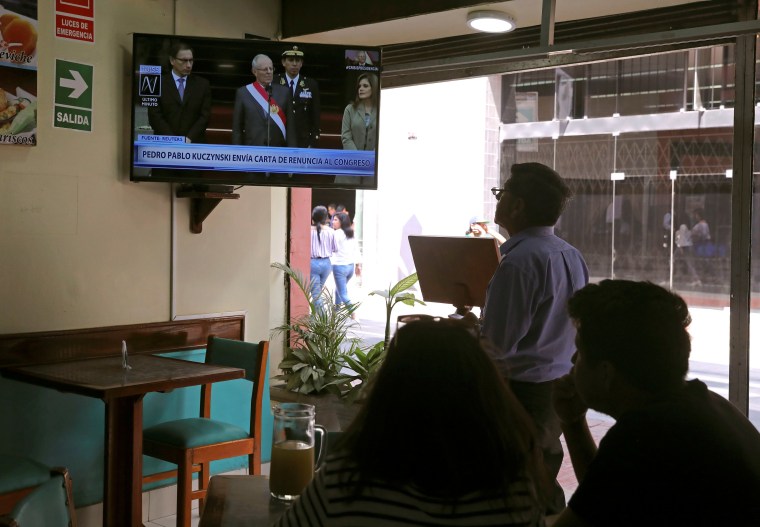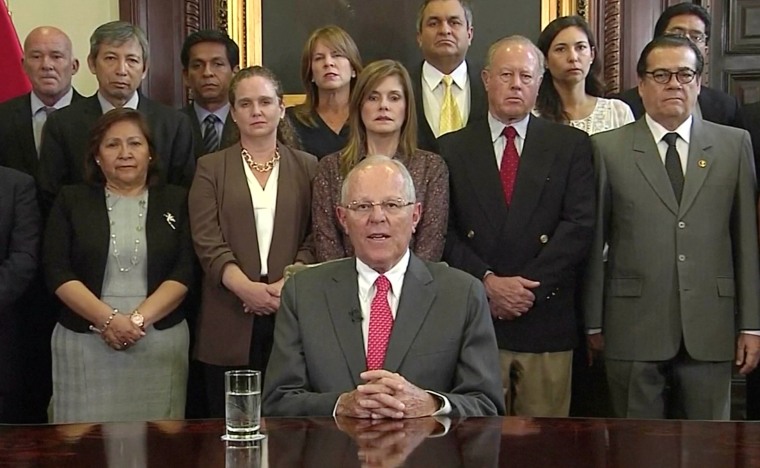LIMA — Peru’s President Pedro Pablo Kuczynski announced he had submitted his resignation to the country's Congress on Wednesday after vote-buying allegations ensnared his center-right government on the eve of an impeachment vote.
The 79-year-old former Wall Street banker promised an orderly and constitutional transition to power and denied the opposition’s allegations that he was corrupt.
It was unclear whether the opposition-controlled Congress would accept his resignation or move forward with its plan to vote on immediately forcing him from office on Thursday on grounds he is “morally unfit” to govern.
The political drama threatens to thrust the country into a period of political instability just three weeks before U.S. President Donald Trump's scheduled visit to Peru for a regional summit.
WHY HAS KUCZYNSKI OFFERED TO RESIGN?
President Pedro Pablo Kuczynski offered his resignation to Peru's congress after videos emerged showing the president's allies discussing state contracts as political payback for an opposition lawmaker who could vote to block his impeachment.
Impeachment proceedings began after documents showed Kuczynski's private consulting firm received $782,000 in payments from Brazilian construction giant Odebrecht more than a decade ago. Some of those payments overlap with his years as a government minister.

While no one has proven that he committed a crime, proponents for his removal say he should have disclosed the payments, or at the very least, failed to recognize a conflict of interest.
Lawmakers fell eight votes short of the 87 required to impeach Kuczynski in December. Another vote on his removal scheduled for Thursday was expected to be similarly tight.
WHAT IS THE PRESIDENT'S DEFENSE?
The president has likened the attempt to remove him to a coup. His main defender is Kenji Fujimori, who led a splinter group of lawmakers that defied his sister Keiko's leadership of the Popular Force party and blocked the first impeachment attempt. The son of former strongman Alberto Fujimori also appears in one of the videos that sparked renewed calls for his resignation.
Kuczynski contends he left the reins of the consulting company in the hands of a business partner while he served in government, had no knowledge of the Odebrecht payments and paid taxes on all of his earnings. Odebrecht has confirmed the transactions were not part of the larger bribery investigation currently underway in Peru involving the firm.
In his resignation announcement, Kuczynski said the videos where his allies are trying to secure the support of a congressman were edited in a "malicious" manner to give the impression that they were trying to offer public works projects in exchange for the congressman's support.
WHY HAS KUCZYNSKI OFFERED TO RESIGN?
Kuczynski's resignation could throw a wrench into Peru's plans to host President Donald Trump and other regional leaders at next month's Summit of the Americas. If his resignation is approved, power would be transferred to Vice President Martin Vizcarra, who in December said he'd go down with Kuczynski but is now expected to try and fill his shoes.
During his 16 months in office, Kuczynski has been outspoken in his criticism of Venezuelan President Nicolas Maduro, lambasting him as a dictator and inviting regional leaders to Peru to apply pressure on the socialist leader. Vizcarra, a relatively unknown former governor, is expected to pursue a more modest agenda focused on building bridges with Keiko Fujimori's party and maintaining Peru's much-vaunted economic stability.
WHAT IS ODEBRECHT ACCUSED OF DOING IN LATIN AMERICA?
In a 2016 plea deal with the U.S. Justice Department, the construction company admitted to paying nearly $800 million in bribes in a dozen countries — all but two of which are in Latin America. The bribes were paid to politicians, their campaigns and political parties to secure lucrative public works contracts that stretched into the highest echelons of government.
In Peru, Odebrecht has acknowledged paying $29 million to politicians in exchange for public works contracts.
WHO HAS BEEN JAILED OR REMOVED FROM OFFICE?
If his resignation is accepted, Kuczynski would become the first sitting president removed from office in Latin America as an indirect consequence of the Odebrecht scandal.
Former Brazilian President Luiz Inacio Lula da Silva is appealing a corruption conviction, while former Peruvian President Ollanta Humala is in jail awaiting trial. Another former Peruvian president, Alejandro Toledo, has been accused of taking $20 million in bribes from Odebrecht and is currently in the U.S. seeking to avoid extradition. In Ecuador, Vice President Jorge Glas was recently sentenced to six years in prison for orchestrating an Odebrecht bribe scheme.
Meanwhile, dozens of other political leaders are under investigation as public prosecutors across Latin America continue to bring charges against lawmakers who participated in the scheme.

